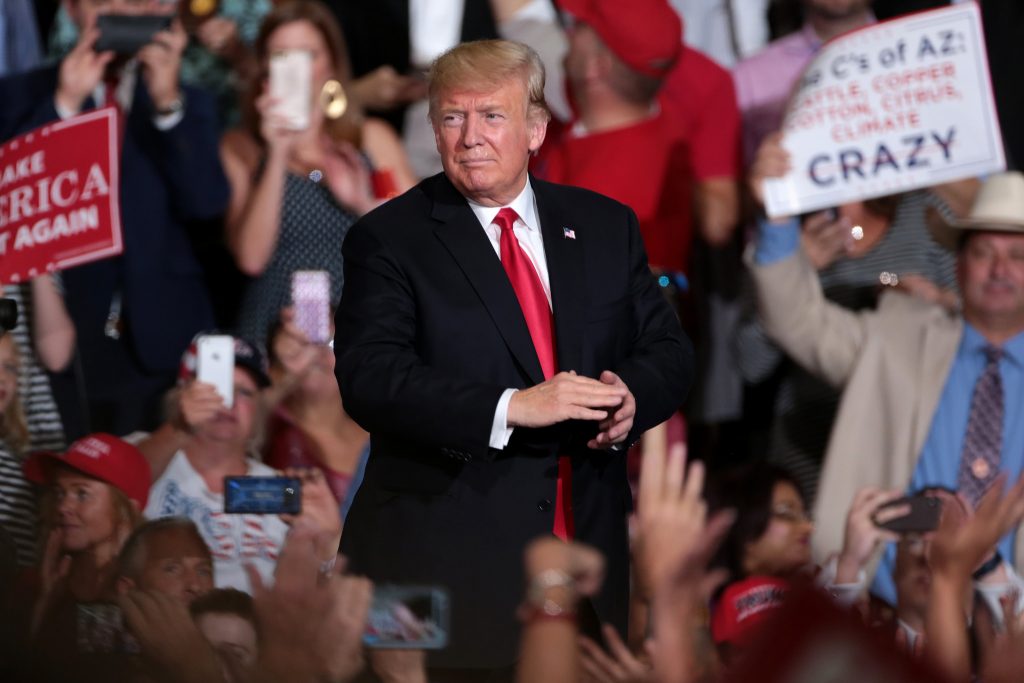Image Credits: Gage Skidmore/Flickr.
With America so divided politically and upended by the pandemic there’s a widespread thirst for normalcy. We want to leave home without a mask, go back to the office, put the kids on the school bus.
The year started with our president awaiting trial for committing impeachable offenses. It saw the world grapple with volcanos, earthquakes, floods, wildfires, locusts, and the emergence of a global pandemic. And this was all in the first 100 days.
Throughout it all, one hope has lingered. In November, America will vote on whether or not to retain Donald Trump as its president.
But, if 2020 stays true to its nature, the election won’t bring clarity, but a true constitutional crisis.
Barton Gellman, writing in the Atlantic, explains how events might unfold if there isn’t a clear winner on Election Night:
The Twentieth Amendment is crystal clear that the president’s term in office “shall end” at noon on January 20, but two men could show up to be sworn in. One of them would arrive with all the tools and power of the presidency already in hand…
…We are accustomed to choosing electors by popular vote, but nothing in the Constitution says it has to be that way. Article II provides that each state shall appoint electors “in such Manner as the Legislature thereof may direct.” Since the late 19th century, every state has ceded the decision to its voters. Even so, the Supreme Court affirmed in Bush v. Gore that a state “can take back the power to appoint electors.” How and when a state might do so has not been tested for well over a century.
Trump may test this. According to sources in the Republican Party at the state and national levels, the Trump campaign is discussing contingency plans to bypass election results and appoint loyal electors in battleground states where Republicans hold the legislative majority. With a justification based on claims of rampant fraud, Trump would ask state legislators to set aside the popular vote and exercise their power to choose a slate of electors directly. The longer Trump succeeds in keeping the vote count in doubt, the more pressure legislators will feel to act before the safe-harbor deadline expires.
If Trump wins the most Electoral College votes, these maneuvers will be unnecessary, and he will ungraciously accept Joe Biden’s concession. However, if he is clearly behind or slightly ahead but predicted to lose once all the mail-in, absentee and provisional ballots are counted, this strategy of manipulating the election in selected states could be utilized.
Imagine Iowa, where the polls show a deadlocked race and the Republicans control the legislature and the governor’s mansion. Rather than concede that he has narrowly lost the state, Trump-loyal state legislators could have the Biden electors thrown out and declare him the winner. Their excuse would be that irregularities in the vote make it impossible to determine who actually had the most support.
Obviously, Democrats across the country wouldn’t accept this. But the plan doesn’t contemplate acceptance. The point is to stay in power despite losing, and that requires a willingness to rely on the power of the state to crush all resistance.
Joe Biden has expressed confidence that the military will escort Trump out of the White House if he is defeated and refuses to leave. That’s probably a safe bet. But what if the election is truly undecided because it’s unclear that it was constitutionally impermissible for, say, the Iowa legislature to choose their pro-Trump electors?
Will the military not defer to the Courts?
The country is crying out for normalcy, but time and again it gets chaos. It some ways, it seems completely on brand for 2020 to extend this chaos all the way to Inauguration Day in January 2021. Why would this year from hell be content with staying within its own boundaries?
